Landscape Gardening in Cleaners E5: Transform Your Outdoor Space
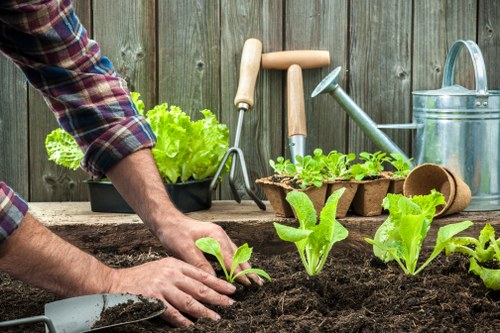
Landscape gardening is more than just planting flowers and shrubs; it's about creating a harmonious and aesthetically pleasing outdoor environment that enhances the beauty and functionality of your home. In the vibrant community of Cleaners E5, landscape gardening has become an essential aspect of property enhancement, providing residents with stunning gardens that reflect their personal style and meet their specific needs.
In Cleaners E5, the unique climate and soil conditions offer a diverse range of possibilities for garden design. Whether you have a sprawling backyard or a compact urban garden, landscape gardening can transform any space into a green oasis. This article delves into the various aspects of landscape gardening in Cleaners E5, offering insights and tips to help you achieve a garden that not only looks beautiful but also thrives throughout the year.
From selecting the right plants to implementing sustainable gardening practices, our comprehensive guide covers everything you need to know to embark on your landscape gardening journey in Cleaners E5.
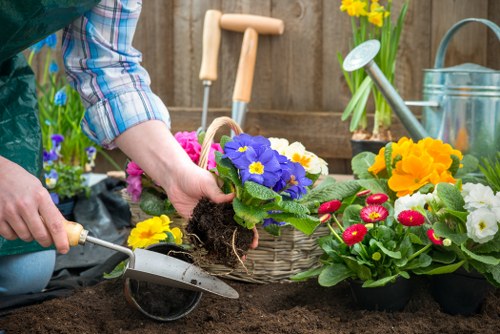
The Benefits of Landscape Gardening
Engaging in landscape gardening offers numerous benefits that extend beyond mere aesthetics. Here are some of the key advantages:
- Enhanced Curb Appeal: A well-designed garden can significantly boost the visual appeal of your property, making it more attractive to visitors and potential buyers.
- Increased Property Value: Beautiful landscaping can increase the market value of your home, providing a higher return on investment.
- Environmental Benefits: Gardens contribute to a healthier environment by improving air quality, reducing carbon dioxide levels, and providing habitats for local wildlife.
- Personal Well-being: Spending time in a garden has been shown to reduce stress, improve mental health, and promote physical activity.
- Energy Efficiency: Strategically placed trees and plants can provide shade and windbreaks, reducing the need for heating and cooling in your home.
These benefits make landscape gardening a worthwhile endeavor for homeowners in Cleaners E5 looking to enhance their living spaces and contribute positively to the environment.
Investing in quality landscaping not only transforms your outdoor space but also fosters a sense of community pride and environmental stewardship.
Moreover, a well-maintained garden can serve as a personal sanctuary, offering a peaceful retreat from the hustle and bustle of daily life.
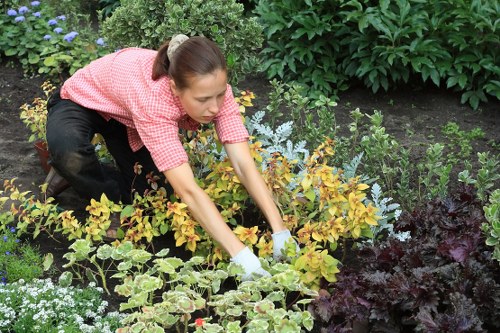
Choosing the Right Plants for Cleaners E5
Selecting the appropriate plants is crucial for ensuring the success and sustainability of your garden. In Cleaners E5, the climate and soil conditions favor a wide variety of plants, but it's important to choose species that are well-suited to the local environment.
Native Plants
Native plants are those that occur naturally in the region and are adapted to the local climate and soil. They require less maintenance, are more resistant to pests and diseases, and support local wildlife. Incorporating native plants into your garden can create a harmonious ecosystem and reduce the need for chemical pesticides and fertilizers.
Some popular native plants for Cleaners E5 include Lavender, Holly, and various types of ferns. These plants not only add beauty to your garden but also provide essential habitats for bees, butterflies, and birds.
Additionally, native plants often have deeper root systems, which help in soil stabilization and water conservation.
Seasonal Flowers
Incorporating seasonal flowers into your landscape design adds vibrant colors and ensures that your garden remains attractive throughout the year. Spring blossoms, summer blooms, autumn hues, and winter evergreens can be strategically placed to provide continuous visual interest.
- Spring: Tulips, Daffodils, and Cherry Blossoms
- Summer: Roses, Sunflowers, and Marigolds
- Autumn: Chrysanthemums, Asters, and Sedum
- Winter: Poinsettias, Christmas Cactus, and Boxwood
By planning for seasonal changes, you can maintain a dynamic and engaging garden that reflects the natural cycles of the year.
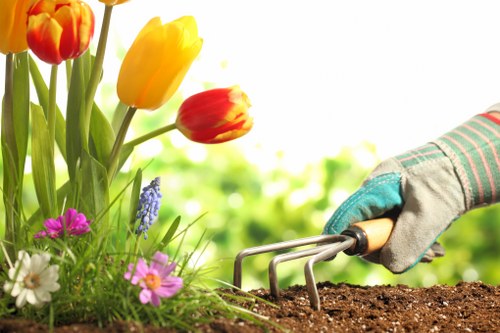
Designing Your Garden Layout
A thoughtful garden layout is the foundation of effective landscape gardening. It involves planning the arrangement of elements such as plants, pathways, water features, and seating areas to create a cohesive and functional outdoor space.
Assessing Your Space
Begin by evaluating the size, shape, and existing features of your garden space. Consider factors like sunlight exposure, soil quality, drainage, and wind patterns, as these will influence your plant selection and garden layout.
Take note of any existing structures, trees, or shrubs that you want to retain or remove. Understanding the natural flow of your garden will help in creating a design that complements the environment.
Planning Zones
Dividing your garden into functional zones can enhance its usability and aesthetic appeal. Common zones include:
- Entryway: The first impression of your garden, often featuring colorful plants and pathways.
- Seating Area: A designated space for relaxation, such as a patio or gazebo surrounded by lush greenery.
- Vegetable Garden: A productive area for growing herbs, vegetables, and edible plants.
- Water Feature: Elements like fountains, ponds, or streams that add tranquility and attract wildlife.
- Play Area: A safe and engaging space for children to play.
By thoughtfully planning each zone, you can create a balanced and harmonious garden that meets your lifestyle needs.
Integrating various elements seamlessly can turn your garden into a multifunctional space that offers both beauty and practicality.
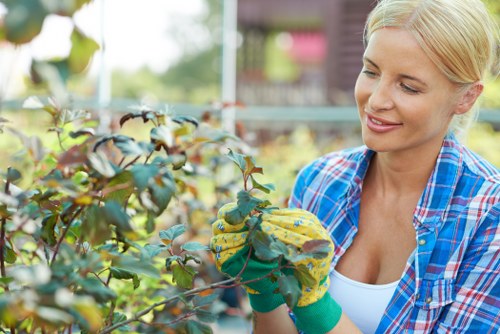
Sustainable Gardening Practices
Embracing sustainable gardening practices is essential for creating an eco-friendly and resilient garden in Cleaners E5. These practices help conserve resources, reduce environmental impact, and promote biodiversity.
Water Conservation
Water is a precious resource, and conserving it is paramount in sustainable gardening. Implementing water-saving techniques such as drip irrigation, rainwater harvesting, and mulching can significantly reduce water usage.
- Drip Irrigation: Delivers water directly to the plant roots, minimizing evaporation and runoff.
- Rainwater Harvesting: Collects and stores rainwater for garden use, reducing reliance on municipal water supplies.
- Mulching: Covers the soil to retain moisture, suppress weeds, and regulate soil temperature.
By adopting these methods, you can maintain a healthy garden while minimizing your environmental footprint.
Additionally, choosing drought-resistant plants can further enhance your garden's sustainability by reducing the need for frequent watering.
Organic Gardening
Organic gardening avoids the use of synthetic fertilizers and pesticides, opting instead for natural alternatives that promote soil health and protect plant life. Practices such as composting, crop rotation, and the use of beneficial insects contribute to a thriving and balanced ecosystem.
Creating rich, fertile soil through composting enhances plant growth and resilience, while attracting beneficial insects like ladybugs and bees supports pollination and pest control naturally.
Maintaining an organic garden not only benefits your plants but also contributes to a healthier environment by reducing chemical runoff and preserving local biodiversity.

Maintenance Tips for a Thriving Garden
Proper maintenance is key to ensuring your landscape garden remains vibrant and healthy throughout the seasons. Here are some essential maintenance tips for your Cleaners E5 garden:
Regular Pruning
Pruning helps maintain the shape and structure of your plants, promotes healthy growth, and prevents the spread of diseases. Regularly remove dead or diseased branches and trim overgrown areas to encourage robust plant development.
Weed Control
Weeds compete with your desired plants for nutrients, water, and sunlight. Implementing effective weed control methods, such as hand-pulling, mulching, and using organic herbicides, can keep your garden clean and thriving.
Soil Health
Maintaining healthy soil is fundamental to a successful garden. Conduct periodic soil tests to assess nutrient levels and pH balance. Amend the soil with organic matter like compost or manure to improve fertility and texture.
- Composting: Recycles kitchen and garden waste into nutrient-rich compost.
- Mulching: Helps retain soil moisture and suppress weeds.
- Crop Rotation: Prevents soil depletion by varying plant species each season.

Incorporating Hardscape Elements
Hardscape elements add functionality and structure to your garden, enhancing its overall design and usability. Integrating features like pathways, patios, fences, and lighting can transform your outdoor space into a cohesive and inviting environment.
Pathways and Walkways
Pathways guide visitors through your garden, providing easy access to different areas and highlighting key features. Materials such as stone, gravel, brick, or wood can be used to create durable and attractive walkways that complement your garden's aesthetic.
Patios and Outdoor Living Spaces
Creating a dedicated outdoor living area allows you to enjoy your garden year-round. Patios can be furnished with comfortable seating, dining sets, and even outdoor kitchens, providing a perfect setting for relaxation and entertainment.
Water Features and Fountains
Water features like ponds, fountains, and waterfalls add a sense of tranquility and elegance to your garden. The soothing sound of flowing water enhances the ambiance and attracts wildlife, creating a peaceful sanctuary.

Lighting Your Garden
Proper lighting not only enhances the beauty of your garden at night but also extends its usability after dark. Thoughtfully placed lights can highlight architectural features, illuminate pathways, and create a warm and inviting atmosphere.
Pathway Lighting
Installing lights along walkways ensures safety and adds a decorative touch. Options include solar-powered stakes, low-voltage LED lights, and lantern-style fixtures that provide ample illumination without overpowering the natural surroundings.
Accent Lighting
Accent lights can be used to highlight specific plants, trees, or garden structures, drawing attention to their unique features. Spotlights, uplights, and gobo lights are effective tools for creating focal points and adding depth to your garden design.
Ambient Lighting
Ambient lighting creates a general illumination that enhances the overall atmosphere of your outdoor space. String lights, lanterns, and fairy lights can provide a soft and inviting glow, perfect for evening gatherings and relaxing under the stars.

Choosing the Right Landscape Gardening Services in Cleaners E5
While some homeowners enjoy taking on gardening projects themselves, many prefer to enlist the expertise of professional landscape gardeners. Hiring the right service in Cleaners E5 ensures that your garden is designed and maintained to the highest standards.
Expertise and Experience
Professional landscapers bring a wealth of knowledge and experience to your garden project. They can provide valuable insights into plant selection, garden design, and sustainable practices tailored to the specific conditions of Cleaners E5.
Customized Solutions
Every garden is unique, and a professional landscaper can create customized solutions that reflect your personal preferences and lifestyle. From modern minimalist designs to lush, traditional gardens, they can bring your vision to life.
Maintenance Services
Ongoing maintenance is essential for a thriving garden. Professional services offer regular upkeep, including pruning, weeding, fertilizing, and pest control, ensuring that your garden remains healthy and vibrant year-round.

DIY Landscape Gardening Tips
For those who prefer a hands-on approach, DIY landscape gardening can be a rewarding experience. Here are some tips to help you create a beautiful garden in Cleaners E5:
Start with a Plan
Begin by sketching a layout of your garden, outlining the placement of plants, pathways, and other elements. A clear plan helps in organizing your ideas and ensuring a balanced and functional design.
Choose Quality Materials
Investing in high-quality plants, soil, and gardening tools can make a significant difference in the outcome of your garden. Healthy plants and well-prepared soil are the foundation of a thriving landscape.
Regular Maintenance
Consistency is key to maintaining your garden's beauty. Schedule regular tasks such as watering, pruning, and fertilizing to keep your plants healthy and prevent issues from escalating.
Additional Tips:
- Utilize vertical gardening techniques to maximize space.
- Incorporate composting to enrich your soil naturally.
- Rotate your plants to ensure even growth and prevent soil depletion.
By following these DIY tips, you can create and maintain a stunning landscape garden that enhances your home and personal well-being.
Embracing a proactive approach to gardening empowers you to take full control of your outdoor space, fostering a deeper connection with nature.

Integrating Technology in Landscape Gardening
Modern technology offers innovative solutions to enhance and simplify landscape gardening. Integrating these advancements can lead to a more efficient and enjoyable gardening experience.
Smart Irrigation Systems
Smart irrigation systems automate the watering process, ensuring that your plants receive the right amount of moisture at the optimal times. These systems can be controlled remotely, allowing for adjustments based on weather conditions and plant needs.
Garden Sensors
Soil and climate sensors provide real-time data on moisture levels, temperature, and light exposure. This information helps in making informed decisions about plant care and garden management.
Automated Lighting
Automated lighting systems can be programmed to turn on and off at specific times, enhancing security and ambiance in your garden. Motion-sensor lights are an excellent addition for pathways and entry points.
Garden Management Apps
Various apps offer tools for garden planning, plant identification, and maintenance scheduling. These digital resources make it easier to organize and track your gardening activities.

Seasonal Care and Preparation
Preparing your garden for different seasons ensures its longevity and health. Each season presents unique challenges and opportunities for garden care.
Spring Preparation
Spring is an ideal time for planting new flowers and vegetables. Clear any debris from the winter months, replenish soil nutrients with compost, and start pruning shrubs and trees to encourage healthy growth.
Summer Maintenance
During the summer, focus on watering, weeding, and protecting plants from excessive heat. Implementing shade cloths and mulching can help retain moisture and keep soil temperatures stable.
Autumn Cleanup
Autumn requires preparation for the colder months. Remove dead plants, rake fallen leaves, and plant bulbous flowers for spring blooms. It's also a good time to aerate the soil and apply fertilizers to strengthen plants before winter.
Winter Protection
In winter, protect susceptible plants by covering them with frost cloths or burlap. Trim back perennials, and ensure that the garden structures are secure against harsh weather conditions.
Additional Seasonal Tips:
- Rotate crops annually to maintain soil health.
- Use winter mulch to insulate plant roots.
- Plan for spring planting during the late winter months.
By staying proactive and adapting your gardening techniques to each season, you can maintain a vibrant and resilient landscape garden throughout the year.
Emphasizing seasonal care fosters a dynamic garden that evolves with nature's rhythms, providing continuous beauty and enjoyment.

Maximizing Small Garden Spaces
Even with limited space, you can create a stunning landscape garden in Cleaners E5. Here are strategies to make the most of small garden areas:
Vertical Gardening
Utilize vertical space by installing trellises, vertical planters, or hanging pots. Growing climbing plants like vines, herbs, and succulents can add greenery without taking up valuable ground space.
Container Gardening
Containers offer flexibility and mobility, allowing you to arrange plants in creative and space-efficient ways. Choose a variety of pots and planters to add texture and color to your garden.
Multi-functional Features
Incorporate features that serve multiple purposes, such as benches with built-in storage or pergolas that provide shade and support climbing plants. This approach maximizes functionality without overcrowding the space.
Mirror and Reflective Surfaces
Using mirrors or reflective surfaces can create the illusion of a larger space by reflecting light and greenery. Strategically placing these elements can visually expand your garden area.
Additional Space-Saving Tips:
- Choose compact plant varieties suited for small spaces.
- Implement a monochromatic color scheme to create a sense of unity.
- Use lightweight materials for structures and decorations.
With thoughtful planning and innovative design, small garden spaces can be transformed into lush and inviting landscapes that offer both beauty and functionality.
Embracing space-efficient techniques enables you to enjoy the benefits of landscape gardening, regardless of your garden's size.

Enhancing Wildlife in Your Garden
Creating a garden that attracts wildlife not only supports local ecosystems but also adds an element of liveliness and diversity to your outdoor space. Here are ways to enhance wildlife presence in your Cleaners E5 garden:
Bird-Friendly Plants
Planting species that provide food and shelter for birds can encourage avian visitors. Consider including berry-producing shrubs, nectar-rich flowers, and seed-bearing plants to attract a variety of bird species.
Butterfly Gardens
Butterflies add color and grace to your garden. Planting nectar-rich flowers like lavender, milkweed, and coneflowers can attract butterflies, while host plants like parsley and fennel support their life cycles.
Insect Hotels
Providing habitats for beneficial insects can enhance pollination and natural pest control. Insect hotels, bee houses, and simple piles of logs or stones offer refuge for solitary bees, ladybugs, and other beneficial insects.
Water Sources
A small pond, birdbath, or water feature can attract various wildlife, including birds, amphibians, and insects. Ensure that water sources are maintained and safe for the creatures that visit.
Additional Wildlife-Friendly Practices:
- Avoid using pesticides that can harm beneficial insects and wildlife.
- Provide nesting boxes for birds and other creatures.
- Incorporate a variety of plant species to support diverse wildlife.
By creating a wildlife-friendly garden, you contribute to the preservation of local biodiversity and enjoy the dynamic interactions of nature right in your backyard.
Fostering a habitat for wildlife enriches your garden's ecosystem, creating a lively and sustainable outdoor environment.

Conclusion: Achieving Your Dream Garden in Cleaners E5
Landscape gardening in Cleaners E5 offers endless possibilities for transforming your outdoor space into a personal paradise. By understanding the benefits, selecting the right plants, designing thoughtfully, and embracing sustainable practices, you can create a garden that is not only beautiful but also resilient and environmentally friendly.
Whether you choose to embark on a DIY project or hire professional landscape gardeners, the key to success lies in planning, maintenance, and a genuine passion for gardening. With dedication and creativity, your Cleaners E5 garden can become a stunning reflection of your style and a cherished space for relaxation and enjoyment.
Ready to transform your garden? Contact us today to start your landscape gardening journey in Cleaners E5 and bring your dream outdoor space to life.
Book your service now and take the first step towards a breathtaking garden that you can enjoy for years to come.


